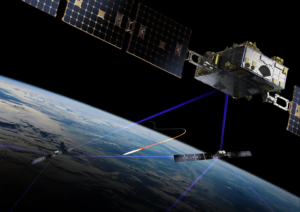Consolidation in the commercial space sector, which saw 39 acquisitions in 2023, is expected to continue as companies look to speed up their supply chains to capitalize on demand for scalable technologies.

NewSpace companies have a chance to thrive in the market, but the ability to produce and deliver technologies at scale will be a driving factor in success, Jonathan Baliff, chief financial officer and board member at space tech company Redwire, said during the June 20 webinar “Changing tides: Thriving in the evolving space investment landscape” presented by Connectivity Business News.
Jacksonville, Fla-based Redwire (NYSE: RDW), which was founded in June 2020 and went public in September 2021, already lists nine acquisitions on its company website.
“There’s no doubt that payloads associated with national security such as radiofrequency antennas and types of optical (technologies) are very important,” Baliff said.
But companies developing propulsion technologies, which are not receiving enough investment, are among the most likely to consolidate, he said.
Keeping pace with constellations
Companies that can keep up with manufacturing demand may have an easier time securing new funding, Noel Rimalovski, managing director at New York-based investment bank GH Partners, said during the webinar.
Being able to scale a technology “makes a company much more investable,” Rimalovski said.
“You have probably dozens of propulsion companies that have received venture capital funding with extraordinary promises that they’ll be able to deliver these capabilities,” he said.

While some of those companies have already demonstrated their propulsion technologies in space, the ability to manufacture at scale is a challenge that could necessitate consolidation, Rimalovski said.
“A lot of these small companies don’t know how to scale and the end user is going to want to know that things can be built on time and work once they’re in space,” he said.
Both the public and private sectors are prioritizing the supply chain more than ever due to the expansion of satellite networks, Rimalovski said.
“Whether it’s commercial companies or government programs, we’re now making hundreds, if not thousands, of satellites,” he said.
National security drives investment
Smaller space firms may use M&A to save capital and time, particularly when trying to secure and fulfill national security contracts, Mira Ricardel, principal for strategic advisory services at Washington-based risk management firm The Chertoff Group, said during the webinar.

National security programs require certification of components and materials for space systems, which can be challenging for smaller companies, said Ricardel, who previously served as deputy national security adviser for the United States.
“When you have the ability to manufacture at scale, you can also amortize the certification process, which for some of these programs can be very expensive,” she said, adding that the process can be long and complex.
Despite the complexities of getting into the national security sector, defense agencies are a major source of demand for commercial space technologies, Maureen Haverty, investment principal at London-based investment firm Seraphim Space, said during the webinar.
“The departments of defense in the U.S. and elsewhere are the most sophisticated use of space by far,” Haverty said. “If you can’t sell to the most experienced customer, you’re cutting out one very large customer.”
Looking toward the future
Even large space firms are looking to expand their business through M&A. Luxembourg-based satellite operator SES, which on April 30 announced plans to acquire McLean, Va.-based satellite operate Intelsat for $3.1 billion, cited increasing its presence in the national security sector as a motivating factor in the companies’ decision to consolidate.
Rod Drury, vice president of global business, strategy and business development at Bethesda, Md.-based defense contractor Lockheed Martin, told CBN in April that Lockheed “is always looking for acquisition opportunities.”
Lockheed in March had stated intentions of acquiring Boca Raton, Fla.-based satellite manufacturer Terran Orbital for $600 million before calling off its bid in a May 2 regulatory filing.

Ricardel said during the webinar that the M&A trend will likely continue and that global tensions will be a driving factor in space investment going into next year.
“2025 is going to be a much more dynamic year in terms of geopolitical risks. There’s just a lot of things percolating in the world,” Ricardel said. “I think we’re in for a bit of a ride coming into 2025.”
To hear more from the CBN webinar panelists on how companies can thrive in the evolving space investment landscape, click here.









